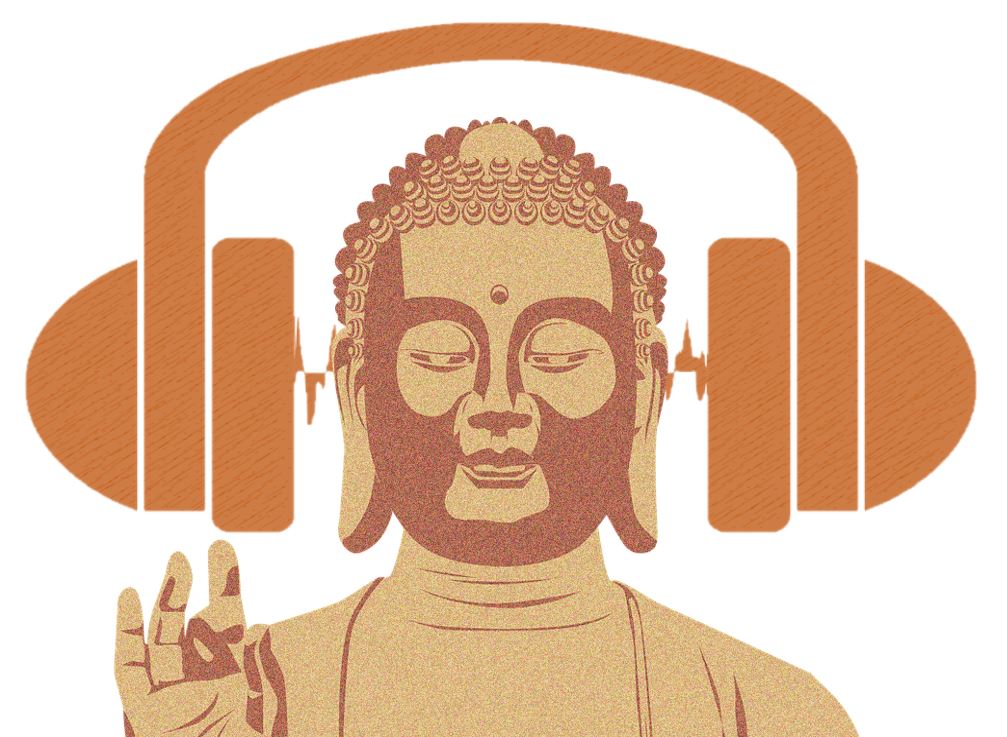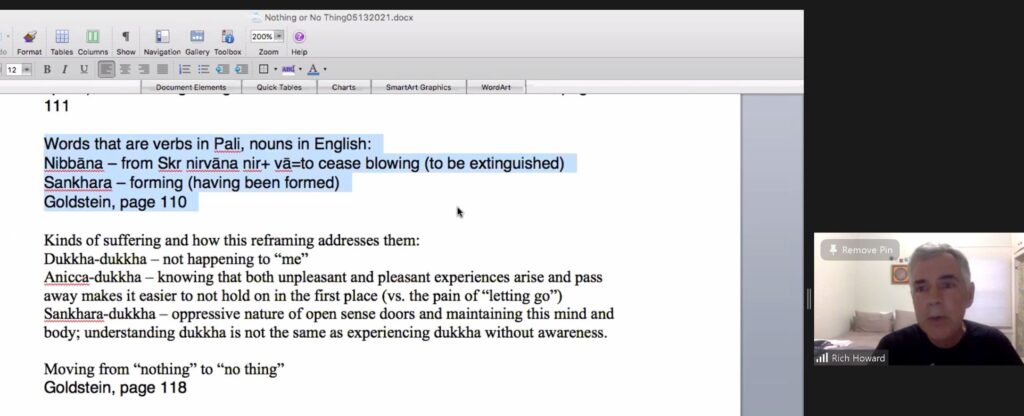We sometimes resort to strategies of planning and controlling as a refuge in times of uncertainty, but changing conditions often render this strategy ineffective at best, or frustrating and disappointing or perhaps even depressing. Our practice teaches us the value of continuous mindfulness, so why not adopt a more reliable strategy: TBA – To Be Aware!! Allowing awareness to connect with the changing nature of present moment experience keeps us from speculating about future outcomes that may never happen and saves us from punishing judgements about what has already happened. We will explore how TBA can help us reduce our dissatisfaction and discontentment and be more present to our life.
Tag Archive for: Rich Howard
Vesak is the most important holiday of the year for Buddhists. It celebrates the Buddha’s birth, awakening, and passing into nibbana (parinibbana) at death. In many countries, it is recognized on the Full Moon Day of May as a national holiday. We will look at how the day is celebrated throughout the world, and then look at how we might take inspiration from these celebrations and from the life of the Buddha for our own practice.
As practitioners of mindful awareness, we want to remain openhearted to the suffering in the world. Our practice teaches us to turn toward conditions as they are, without needing to avoid unpleasant sensations, emotions, or thoughts. This openheartedness leads naturally to compassion, the impulse to take action on behalf of those who are experiencing suffering. However, Western psychology has recognized a condition called “compassion fatigue,” the “secondary trauma” that can result from helping others and that may lead to diminished capacity to empathize or feel compassion. Given all the suffering in the world and our access to it via global media, we may be overwhelmed and start to shut down to the world and those close to us. This evening, we will take a look at how our practice may help us recognize compassion fatigue as it develops and maintain an open heart.
Developing a Mind/Heart of Peace The Paramis are qualities of heart that when developed bring the highest blessing, which is peace. In honor of the passing of Thich Nhat Hanh, Rich will use illustrations from the beloved Zen Master’s life for development of the Paramis in daily life. We will see how Thay embodied patience, renunciation, determination, truthfulness, and other qualities of the heart to bring peace at the individual, community, and global scales. Please bring a story of how you have been influenced by Thich Nhat Hanh’s teaching, in person, online, or through his writing: a short quote, a song, a poem, or one of his books. We have invited special guest Helen Hobart to share her experience practicing with Thay.
Rich donated all the dana he received from the presentation to the Thich Nhat Hanh Foundation.
While the end of a calendar year is somewhat arbitrary, it offers us a chance to look back on the previous year and to look forward to the year to come. In terms of practice, we can think of these activities as Wise Reflection and Wise Intention. For this evening, we will be using a beginning – the first section of the Dhammapada, which Jack Kornfield calls “the most beloved of all Buddhist texts, both poetic and profound.” Titled “Dichotomies” in Gil Fronsdal’s translation (Shambhala, 2008), this text contains reminders of the power of our thoughts and actions, and discernment in choosing a path of happiness and away from quarrels.
The placement of a text at the beginning of a collection was not arbitrary when the Pali Canon was assembled – important texts like this one were intentionally placed first. We will take a slow tour through this poem and see what it offers for our year-end reflection and intention. Feel free to have your own copy of the Dhammapada at hand; it is often fruitful to see how different translators approach a text.
The two book titles mentioned in this presentation are:
- Do You Know Who You Are?: Reading the Buddha’s Discourses by author Krishnan Venkatesh
- The Question of King Ajatasattu (a book-length essay) by author Mu Soeng
The three trainings of the eightfold path are the training in moral integrity (sila), the training in meditation (bhavana), and the training in wisdom (pañña). They are taught in many places in the Pali Canon, nowhere more powerfully than in the Samaññaphala Sutta (Digha Nikaya 2). This sutta, the story of an encounter between the historical Buddha and King Ajatasattu, contains a survey of the other philosophical traditions of the Buddha’s time, a summary of the essence of the Buddha’s teachings illustrated with beautiful similes, and (spoiler alert!) a sad refusal by the King to accept this teaching as the basis for transforming his life. Inspired by two chapters on this sutta (characterized as “almost a Greek tragedy”) in Krishnan Venkatesh’s book “Do You Know Who You Are?” and a book-length essay by Mu Soeng “The Question of King Ajatasattu” (“rightly called one of the most important texts in the Pali Canon”), we will explore in depth how we might answer the King’s question reframed for ourselves: what is the fruit of practice, and what are we willing to do to attain it? This evening’s introduction will help prepare for the SIM daylong on October 30, although both events will stand alone as opportunities to look at the teachings, our practice, and our lives.

On the eve of SIM’s second online annual retreat, let us consider retreat practice in general and online retreat practice in particular. What is unique about online retreat? Are there distinct advantages to in-person retreats? What can we do to make the most of an online retreat? Please be prepared to share your retreat experience – online or in person – in the era of pandemic isolation.

For many, sight is the primary connection to the outside world. We marvel at a sunset, smile at an infant, react to a political poster. These sights can bring pleasure or anger, connection or revulsion. But are we aware of the act of seeing itself? “Why have we never noticed seeing?” asks Sayadaw U Tejaniya. We will explore the differences between looking and seeing and its implications for our formal meditation and daily life practice.

The mind tends to solidify experience and to grasp for security in comfort, familiarity, and habitual patterns. This is natural, a long-established pattern to help negotiate a complex world in the face of threats and unknowns. Even our language reinforces this dependence on solid objects versus processes, using nouns to translate words that are verbs in Pali, the original language of the early Buddhist texts. This talk will expand on the theme of investigating the concept of “self” that all three SIM faculty explored in February. Be prepared to share insights you may have received in working with this area of practice.
“Insight Meditation: A Psychology of Freedom” by Joseph Goldstein and “Crazy Wisdom” by Chögyam Trungpa
Books referenced in this talk

Who Am I? What Do I Want? What Do I Believe?:
Finding and Losing Your Self

The Buddhist concept of “not self” can be very confusing if we let it linger as a subject of philosophical speculation or distant conceptual notion. On the other hand, the Buddha taught the illusion of self (anatta in Pali) as one of the three universal characteristics of experience, along with impermanence and unsatisfactoriness; living an embodied insight into how this process works is one avenue to awakening.
Two of the basic processes we have taught often at SIM offer ways of seeing into how we construct and maintain the sense of self: the five aggregates of clinging and dependent origination. In this presentation, Rich will share some other approaches from classes he attended with Steve Armstrong and Kamala Masters at the Vipassana Metta Foundation and Jay Garfield at the Barre Center for Buddhist Studies. We will place particular emphasis on the ethical and liberating aspects of these teachings.
Visit Us
SIM meets online and in-person at the Sacramento Dharma Center
What is Dana?
Dana is a Buddhist word that means generosity or heart. Nearly all Sacramento Insight Meditation activities are offered on a dana (donations) basis. This means our programs are sustained by the generosity of instructors in offering teachings freely and on the generosity of students and members of the meditative community in the form of financial support, service and participation in events. Practice dana, please support our Sangha. DONATE NOW
